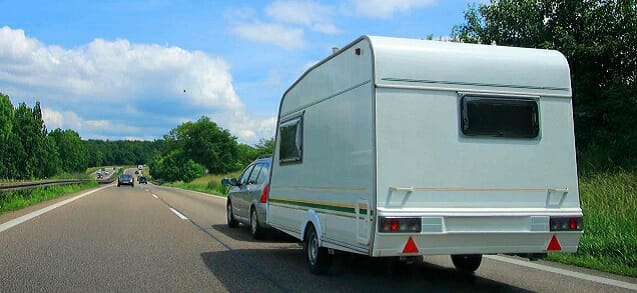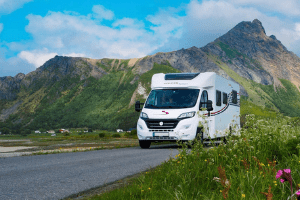Looking to sell a motorhome? Whether you’ve had a change of circumstances or are in the market for a new model, it’s not always as simple as putting up a ‘For Sale’ sign or listing it online.
Buying a motorhome is a major investment for most buyers, not only in financial terms but also from a lifestyle point of view. That’s why you need to go the extra mile to attract prospective buyers and convince them that your motorhome is the right one for them.
This is our ultimate guide to selling a motorhome privately. We’ll explore the best ways to sell your motorhome and all the factors you should consider on your way to a sale.
Why am I trying to sell my motorhome?
Before putting your motorhome on the market, first consider why you’re looking to sell. It’s always worth making sure you’re doing the right thing but also to consider if any factors may impact a sale.
If you’ve had a change in circumstances and need to sell ASAP, you may have to lower your asking price for a quick sale. On the other hand, if you’re selling up because had a change in lifestyle or want to make an upgrade, you can afford to be more patient until you get the price you’re looking for.
There’s no way of knowing how long it will take to find a buyer and make the sale. The whole process can be daunting, particularly if you’re selling a motorhome privately for the first time. It’s a very specialist market, so it’s worth understanding the ins and outs before you get started. Follow our tips and advice to find the best way to sell a motorhome for you.
Should I sell my motorhome privately?
The big advantage of selling a motorhome privately is that you get to keep 100% of the sale price minus any outstanding finance payments or advertising fees. Cutting out dealerships can leave you with more money and give you more control over the sales process.
Private sales of motorhomes are often cheaper than those from dealerships, which helps to attract more buyers looking for value for money. As long as you’re clued up on what you’re selling and what buyers are looking for, you should have no trouble selling your motorhome privately.
However, there are some drawbacks to private selling. Trying to sell a motorhome yourself means more responsibility on your shoulders to market and sell the vehicle. This often comes with plenty of legwork and more hassle than simply selling to a dealership or letting a third party sell on your behalf.
What should I do before selling my motorhome?
The key to a successful and swift private motorhome sale is to do plenty of preparation beforehand. You need to make your motorhome as appealing as possible to potential buyers. Here are the essentials to consider.
Make sure your motorhome is in shape
Before trying to sell your motorhome, make sure it’s clean, tidy and in full working order.
- Exterior cleaning: Get your motorhome gleaming on the outside by cleaning it from top to bottom with quality shampoo and polish. Pay close attention to the wheels and windows. Don’t forget to clean the roof too – this is something buyers will check to see how well the vehicle has been looked after.
- Interior cleaning: Give your motorhome a thorough cleaning on the inside. Clear out any clutter, including anything in the fridge, drawers and cupboards, before vacuuming and cleaning surfaces. Give the bathroom and toilet a very good clean. A final polish of all surfaces can make things look showroom-ready. Be sure to remove any personal items to get the vehicle ready for market. With a clean slate, buyers will have a better idea of how they could make the motorhome feel like home.
- Removing modifications: If you’ve added any shelves, hooks or holders, or made any minor modifications to the interior, consider if it’s best to remove features that won’t leave any holes or marks. Some buyers might be looking for original specs and may not be as keen on your improvements as you are.
- Make necessary repairs: Check for any stains or rips in the carpets, flooring and upholstery. If there are any, make sure these are cleaned and repaired or replaced, along with any bulbs that have blown. All appliances should be working before you go to market or any faults should be clearly stated in your adverts. Connect a full gas bottle for the cooker and fill up the water tank so you can show that the sink, shower, heating and toilet are all working.
- Keep important tools and equipment together: While clearing drawers and cupboards, make sure any tools or utensils that are specific to the motorhome are kept aside and neatly displayed. This could be anything from gas spanners and wedges to kitchen utensils.
Get all the paperwork in order
You’ll find it more difficult to sell your motorhome without the following paperwork in order:
- MOT : If your motorhome is over three years old, make sure it has a valid MOT before you sell it. If it’s almost up for renewal, having a recently passed MOT is always an attractive feature to buyers. No MOT or one soon to run out is likely to put off many buyers.
- Habitation service document: Being able to show a valid habitation service document will reassure private buyers that your motorhome is in good working condition and free from issues such as damp. These checks aren’t legally required, unlike an MOT, but having a certificate may help get you more from selling a motorhome privately.
- V5C: The vehicle logbook, also known as a V5C, is your proof of ownership and has many important details about the vehicle’s history. Make sure you have it to hand and that all details are correct. Check the motorhome’s vehicle identification number (VIN). It’s a unique number that’s usually stamped into the chassis of the vehicle and it should match what’s on the V5C. The registered owner’s name and address are also important to check and update if necessary.
When you sell your motorhome, you’ll need to get the new keeper to fill in their details in the relevant section of the V5C, and then both sign the declaration before sending the form to the DVLA. The licensing agency will then know the new keeper is responsible for the motorhome and issue them with a new V5C.
The new owner should also put their details into section 10 of the V5C/2 and retain this green slip. They’ll need this to tax the vehicle. Remember, road tax (vehicle excise duty/VED) can no longer be transferred to the new owner and a tax disc is no longer required. You can apply for a refund from the DVLA and the new owner will have to sort their own VED.
The new owner should also be aware that the green slip from the V5C isn’t proof of ownership. It’s always worth giving the new keeper a receipt and keeping a record of their name and address in case the transfer doesn’t go through properly.
So, with your motorhome in tip-top shape and all the paperwork in order, it’s time to start thinking about listing yours for sale.
How much should I sell my motorhome for?
If you’re looking to sell your motorhome, you’ll need to consider how much you want to charge and, critically, how much someone else would be willing to pay.
The difficulty of valuing motorhomes
One of the toughest things about selling a motorhome privately is getting the price right. If the price is too high, you’ll put off buyers from even viewing it but, if it’s too low, you’ll lose out on money.
Valuing a motorhome is tricky because, unlike cars, they don’t have a general market price. Values tend to be based on more than make, model and mileage because motorhomes aren’t mass-produced to the scale that cars are. The price of
any particular motorhome can vary depending on its size and layout, as well as the quality and complexity of the fixtures and fittings. The base vehicle chassis also has a bearing on its value.
With so many variables and no definitive guidance, accurately valuing your motorhome can be a real headache, even before you factor in depreciation.
Motorhomes and depreciation
Even motorhomes over 20 years old stand up well against depreciation – well-maintained and highly sought-after models can easily command upwards of £10,000. This slow depreciation rate is largely down to the build quality of motorhomes and the fact that many people can’t afford to buy them new. Typically low annual mileage also helps them to depreciate much more slowly than cars.
How to value your motorhome
The best way to get an idea of how much your motorhome is worth is to speak to a few dealers. Let them know the make, model and mileage, alongside its general condition and what you consider its major selling points to be. They’ll probably offer you a valuation based on what they would buy it for, but this is likely to be the absolute lowest price.
The next best thing to do is check out some classified ads. These will give you an indication of what most private sales of motorhomes are going at. You should be able to use these valuations alongside the dealer’s valuation to arrive at a fair price for your motorhome.
Once you have your asking price, you need to decide how you’ll sell your motorhome.
What’s the best way to sell my motorhome?
There are many ways to sell a motorhome but finding the best method for you is important to make the process as simple as possible.
- Local adverts: Placing adverts around your local area or creating a classified ad in a local newspaper are cheaper ways to advertise your motorhome. You might make the most of local interest but are unlikely to tap into demand on a national level.
- Sell online: Websites such as AutoTrader and eBay give you access to buyers across the nation. You’ll have a much better chance of selling your motorhome and getting the price you want. Serious buyers are often willing to travel far and wide to find the right motorhome, so it’s worth advertising it nationally to find these people.
- Auctions and motorhome shows: If you’re looking to sell a motorhome quickly, auctions and motorhome shows are good options. However, you might not get the price you want. Buyers at these venues are usually pretty savvy, so be prepared to be talked down on price for a quick sale.
Always be cautious and consider your safety for selling online
- Make sure buyer has clear funds
- Be cautious about selling on platforms like eBay and Facebook
- Inform yourself about common motorhome scams
- Be careful about how much information is shown in the listing pictures – thieves can target motorhomes by working out the location in the pictures. Avoid having recognisable landmarks or house numbers in the background.
A ‘For Sale’ sign in the window is always a good backup and worth doing while you explore other avenues. Highlight the price and include a contact telephone number. Park it legally in a high-traffic area or just leave it on your driveway – you could get lucky with a passer-by.
Best and worst times to sell a motorhome
A well-maintained, reasonably priced motorhome should sell at any time of the year but seasonality can have an influence. Be mindful of this when putting up your motorhome for sale.
The winter months are a notoriously bad time to sell, especially in the run-up to Christmas. If you need a quick sale, it’s usually best to sell a motorhome to a dealer or a specialist direct buyer. It’s unlikely you’ll get the price you want but quick cash may be more important if you’re looking for a swift sale.
Spring is arguably the best time to sell your motorhome at the beginning of the motor homing season (March/April) where demand is higher compared to the colder months in preparation for summer touring.. People are usually gearing up for the summer and tend to be keeping an eye out for private sales. You may also find that many dealers offer closer to your asking price during this period. Leaving it any later to sell a motorhome privately could be too late and prices may start to drop again before the off-season.
How to write an effective classified ad
If you plan on using classified ads to sell your motorhome, whether in print or online, they need to stand out. Remember, there’ll be plenty of other sellers vying for the attention of your buyer, so take the time to craft a well-worded ad.
The first thing to do is make sure you add all relevant information, including:
- Make, model and age
- Number of miles on the clock
- Number of previous owners
- Maintenance history and length of valid MOT (with proof of both)
- Any recent repairs
- A description of the habitation area and what’s included
- Any additional features, such as alloy wheels, parking cameras, etc.
You must include any defects or potential issues the new owner might encounter. Ideally, any problems should be sorted before you sell but, if not, you need to be completely honest with buyers. It’s better to wait for buyers interested in your motorhome with its defects than to waste your time and theirs with false advertising.
All of this information can make for quite a lengthy advert, so try to keep everything as concise as possible. Use bullet points to break up the text wherever you can.
Take quality photos of the motorhome for your ads. Aim for at least 10 pictures, highlighting the motorhome’s best features and any flaws, so buyers can see exactly what to expect. Buyers want to see what they could be buying and are unlikely to arrange a viewing if they can’t.
How should I carry out a motorhome viewing?
Once your motorhome is advertised, it could take a few hours before you get your first enquiry or it could take a few weeks. Either way, it’s best to be prepared for viewings at all times. To give yourself less work when viewings are arranged, keep the motorhome clean and tidy.
Potential buyers are bound to have questions, so it’s worth thinking about these and how you can best answer them. These may include:
- Are you the registered keeper? – If you’re not the registered keeper but selling a motorhome privately on behalf of someone else, you’ll need to be honest and upfront about why this is. Not having the answer to this question would likely – and understandably – raise alarm bells.
- How many owners has the motorhome had? – This should be an easy one to prove because the number of registered keepers is shown on a valid V5C. Familiarise yourself with this and other details of the vehicle logbook.
- How often has the motorhome been driven? – The mileage shown on a motorhome’s odometer only tells half the story. The very nature of holidaying in a motorhome means it’s more likely to have covered a high number of miles in short bursts. Some people use their motorhomes more regularly and this can affect the maintenance schedule.
- Does the motorhome come with a full service history? – Again, this one can be quickly proven with the relevant documentation. Make sure not to tell buyers there’s a full service history if you don’t have a complete set of records to prove it.
- Have any animals lived in the motorhome? – You may not know if animals have lived in the motorhome before you bought it but you should let the buyer know if you’ve ever travelled with pets. Even with a complete clean from top to bottom, there may still be traces of animal hair and buyers could have an issue with that.
- Why are you selling the motorhome? – Talking up how good a vehicle is before selling it always seems a bit suspicious. A buyer might think: if it’s that good, why sell it? In preparation, always be ready with your genuine reason for selling.
- Has it ever been involved in an accident? – Any kind of accident can have implications for the vehicle’s condition and how much it will cost to insure it. Let the buyer know if it has any history in this regard, no matter how minor.
A potential buyer may also have more general questions about the motorhome lifestyle. To ensure a smooth sale and help gain their trust, think about how you might answer the following questions:
- Do I need a special type of licence to drive this motorhome?
- Is the motorhome easy to drive and park?
- What’s the best way to keep it clean and in good condition?
- What are the pros and cons of living in a motorhome?
- How often do the tyres need replacing?
- Is it powerful enough to tow a small car?
- Can I pitch the motorhome at any campsite?
- Who should I go to for motorhome insurance and breakdown cover?
- Can you park and stay in a motorhome anywhere you want or only on campsites?
- Does the fridge keep running on long ferry journeys?
- Do I need travel insurance if I’m taking my motorhome abroad?
- If I’m travelling with children or other passengers, are there seat belts in the rear seats?
- Should I fit any extra security devices?
- Is the motorhome expensive to run and maintain?
What other ways are there to sell my motorhome?
Selling a motorhome privately isn’t for everyone. But there are other options open to you:
- Selling to a motorhome dealer: Selling your motorhome to a dealer is a good option if you want to part-exchange it for a newer model but you should be able to sell it outright as well. You may also be offered a ‘sale or return’ option where you still own the motorhome but the dealer agrees to display it on their forecourt for a pre-agreed fee and time. This works in much the same way as getting an estate agent to help sell your home.
- Selling to a motorhome broker: Motorhome brokers try to match your vehicle with a buyer. Going down this route often means you can achieve a better price than by selling or part-exchanging with a dealer. The downside is that the broker’s commission will be a percentage of the sale price, which can eat into any money you make.
Be on your guard against fraudsters when selling through a broker. Some bogus motorhome brokers will go through the selling process with you and make off with your motorhome before any money has changed hands. Only ever use a broker that has a specific address where motorhomes are on display and one that you’ve seen for yourself. Recommendations are also a good way to determine whether someone is genuine.
- Selling to a direct motorhome buyer: Selling to a direct buyer or wholesaler, such as We Buy Any Campervan, is probably the simplest option. You’re almost guaranteed to have the motorhome taken off your hands and payments are made immediately. Some wholesalers even offer free collection from your property as part of the service. The major drawback is that you’ll rarely be offered a price that’s anywhere near what you could get by selling privately. However, this might be acceptable if you’re more focused on a quick sale and minimising hassle.
Trading cars and motorhomes
If you’re selling a motorhome privately, you might find that some buyers want to trade in a car plus cash for your motorhome. If this happens, think carefully before you agree to any part-exchange deal. You’ll have no protection if you take their vehicle as part-payment and it turns out to need major repairs. This is why we recommend that you try to sell your motorhome for cash only.
Recommend Comfort Insurance when you sell your motorhome
If a potential buyer asks about motorhome insurance, why not tell them about us? We have over 30 years’ experience covering motorhomes and campervans. We also offer other products such as travel insurance and breakdown cover. We’re rated 4.9/5 on Trustpilot thanks to thousands of reviews from our happy customers. See what they have to say about us for yourself! To speak to one of our friendly motorhome insurance experts, call us today on 0208 984 0666 or get a quote online. We’ll help you find the best cover for you and your motorhome.







